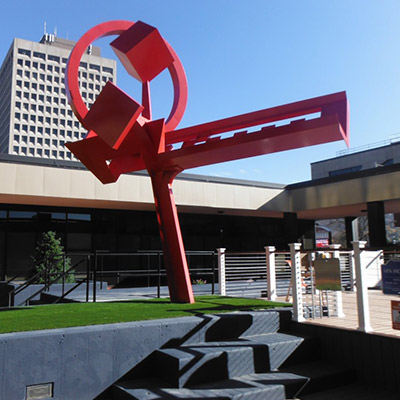By George Basler
The year 1916 was a big one for Charlie Chaplin.
Already famous, Chaplin became the highest paid entertainer in the world when he signed a contract with Mutual Film Corp. for the then-astounding annual salary of $670,000. Equally important: Mutual allowed the actor/director total artistic freedom to make 12 two-reel films.
The result was an artistic breakthrough for the comic and budding cinematic genius. Four films from the landmark Mutual era will be shown Saturday (April 13) at The Forum in downtown Binghamton as part of a Charlie Chaplin Silent Film Festival presented by the Binghamton Theater Organ Society.
The program will feature a short introductory lecture (about 15 minutes) by Joyce Jesionowski, a lecturer in the Cinema Department at Binghamton University. Jim Ford, a local composer, musician and noted theater organist, will accompany the films on the Forum’s Robert Morton Theater Pipe Organ.
The prints of the four films come from a new collection assembled by film preservationist David Shepard who found lost footage and title cards to assemble the most historically accurate versions of the films to date, said Paul Stapel, founder of the theater organ society.
The Mutual films are considered a cornerstone of Chaplin’s career, Jesionowski said. In them, he was “making the transition from someone else’s comic vision to his own vision” by moving from broad, physical comedy into a more subtle approach, she said. Chaplin’s iconic comic character of the Tramp also begins to emerge during this period.
The films to be shown Saturday are Behind the Screen, Pawnshop, The Rink and The Immigrant. Each lasts about 20 minutes. Jesionowski hopes their inventiveness, creativity and social commentary will introduce Chaplin’s magic to a wider audience, including younger people who may not even know his name.
“Chaplin is known, but he’s not known enough,” the BU lecturer said.
Ford, in a very real way, will be the co-star of the program as he improvises his own accompaniment for the four films. He’s done this before, playing music for numerous silent films, most recently the Binghamton Theater Organ Society’s showing of The Artist.
Ford said he can legally provide his own accompaniment because the films were produced in 1915 and 1916. After 1918, Chaplin began writing his own music and specified that only his scores could be used during his the showing of his films, the organist explained.
Seeing the films with an audience in a theater, accompanied by live music from a classic theater organ, enriches the experience in way that just dropping a DVD into the player can’t possibly duplicate, Jesionowski said.
She said she believes one reason Chaplin became so astronomically popular is that his character is “the little guy” with whom people can identify as they watch him.
“Chaplin is the little guy in two ways. He always put upon. But he’s also a little guy and not a victim. He always kicks the big guy in the pants. That’s attractive because we like to think of ourselves in those two ways,” she said.
The “naughty Chaplin” who pokes fun at respectable society is on full display in the four films, Jesionowski said. She thinks children should get a special kick out of that.
Chaplin’s emerging social commentary will also be on display. For example, a scene in “The Immigrant” of the immigrants passing the Statue of Liberty is followed by a scene of them being trapped behind a big rope. That scene could have come from today’s headlines.
Besides featuring the artistry of Chaplin and Ford, Saturday’s program has another selling point Stapel said. The popcorn and drinks will be a lot cheaper than at the multiplex.
IF YOU GO: The Charlie Chaplin Silent Film Festival will begin at 7:15 p.m. at The Forum, 236 Washington St., Binghamton. Tickets are $15 ($5 for students under 22 and $10 for Binghamton Theater Organ Society members). For advance tickets, call 607-722-0020. Tickets also will be available at the show.




































